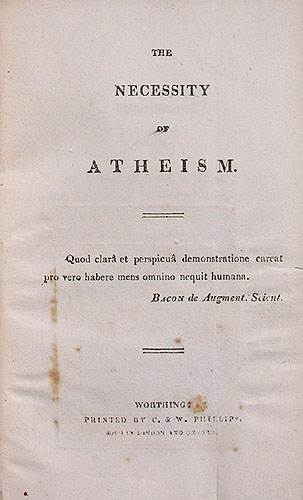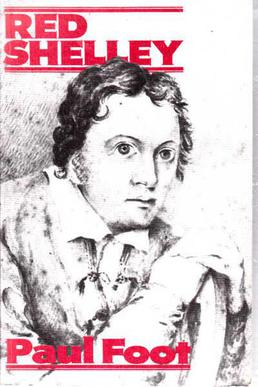Related Research Articles

Perkin Warbeck was a pretender to the English throne claiming to be Richard of Shrewsbury, Duke of York, who was the second son of Edward IV and one of the so-called "Princes in the Tower". Richard, were he alive, would have been the rightful claimant to the throne, assuming that his elder brother Edward V was dead and that he was legitimate—a point that had been previously contested by his uncle, King Richard III.
This article contains information about the literary events and publications of 1819.

"The Necessity of Atheism" is an essay on atheism by the English poet Percy Bysshe Shelley, printed in 1811 by Charles and William Phillips in Worthing while Shelley was a student at University College, Oxford.
Paul Mackintosh Foot was a British investigative journalist, political campaigner, author, and long-time member of the Socialist Workers Party (SWP).

William John Banville is an Irish novelist, short story writer, adapter of dramas and screenwriter. Though he has been described as "the heir to Proust, via Nabokov", Banville himself maintains that W. B. Yeats and Henry James are the two real influences on his work.
The unnamed wife of Pontius Pilate appears only once in the Gospel of Matthew (27:19), where she intercedes with Pilate on Jesus' behalf. It is uncertain whether Pilate was actually married, although it is likely. In later tradition, she becomes known as Procula or Procla and plays a role in various New Testament Apocrypha. At a later date, she acquires the name Claudia Procula in Western tradition, as well as other names and variants of these names. She is venerated as a saint by the Eastern Orthodox Church, the Eastern Catholic Church, the Coptic Church, and the Ethiopian Church. She has also frequently been featured in literature and film.

Peter Neville Frederick Porter OAM was a British-based Australian poet.
William Parron was an Italian astrologer, who worked for Henry VII of England from 1498 to 1503. An author of almanacs and prognostications, he produced the De astrorum vi fatali in 1499 as a private printed prediction for Henry. He also engaged in investigative work on the background of Perkin Warbeck.
Zachary Leader is an Emeritus Professor of English Literature at the University of Roehampton. He was an undergraduate at Northwestern University, and did graduate work at Trinity College, Cambridge and Harvard University, where he was awarded a PhD in English in 1977. Although born and raised in the U.S. he has lived for over forty years in the U.K., and has dual British and American citizenship. His best-known works are The Letters of Kingsley Amis (2001), The Life of Kingsley Amis (2007), a finalist for the 2008 Pulitzer Prize in Biography, and The Life of Saul Bellow: To Fame and Fortune, 1915-1964 (2015), which was shortlisted for the Wingate Prize in the U.K. The Life of Saul Bellow: Love and Strife 1965 to 2005 was published in 2018. He has written and edited a dozen books, including both volumes of the Saul Bellow biography, and is General Editor of The Oxford History of Life-Writing, a seven-volume series published by OUP. A recipient of Guggenheim, Whiting, Huntington, Leverhulme and British Academy Fellowships, he is also a Fellow of the Royal Society of Literature.

Valperga: or, the Life and Adventures of Castruccio, Prince of Lucca is an 1823 historical novel by the Romantic novelist Mary Shelley, set amongst the wars of the Guelphs and Ghibellines.

The Fortunes of Perkin Warbeck: A Romance is an 1830 historical novel by Mary Shelley about the life of Perkin Warbeck. The book takes a Yorkist point of view and proceeds from the conceit that Perkin Warbeck died in childhood and the supposed impostor was indeed Richard of Shrewsbury. Henry VII of England is repeatedly described as a "fiend" who hates Elizabeth of York, his wife and Richard's sister, and the future Henry VIII, mentioned only twice in the novel, is a vile youth who abuses dogs. Her preface establishes that records of the Tower of London, as well as the histories of Edward Hall, Raphael Holinshed, and Francis Bacon, the letters of Sir John Ramsay to Henry VII that are printed in the Appendix to John Pinkerton's History of Scotland establish this as fact. Each chapter opens with a quotation. The entire book is prefaced with a quotation in French by Georges Chastellain and Jean Molinet.
Thomas Michael Maschler was a British publisher and writer. From 1960, he was influential as the head of publishing company Jonathan Cape over a period of more than three decades. Maschler was noted for instituting the Booker Prize for British, Irish and Commonwealth literature in 1969. He was involved in publishing the works of many notable authors, including Ernest Hemingway, Joseph Heller, Gabriel García Márquez, John Lennon, Ian McEwan, Bruce Chatwin and Salman Rushdie.
Events from the 1490s in England.

Fiona Ruth Sampson, is a British poet and writer. She is published in thirty-seven languages and has received a number of national and international awards for her writing. A former musician, Sampson has written on the links between music and poetry, and her work has been set to music by several composers. She has received several prizes for her literary biographies and poetry, notably a MBE for services to literature in 2017.

This is a bibliography of works by Mary Shelley, the British novelist, short story writer, dramatist, essayist, biographer, and travel writer, best known for her Gothic novel Frankenstein: or, The Modern Prometheus (1818). She also edited and promoted the works of her husband, the Romantic poet and philosopher Percy Bysshe Shelley. Until the 1970s, Mary Shelley was known mainly for her efforts to publish Percy Shelley's works and for Frankenstein. Recent scholarship has yielded a more comprehensive view of Mary Shelley’s achievements, however. Scholars have shown increasing interest in her literary output, particularly in her novels, which include the historical novels Valperga (1823) and Perkin Warbeck (1830), the apocalyptic novel The Last Man (1826), and her final two novels, Lodore (1835) and Falkner (1837). Studies of her lesser-known works such as the travel book Rambles in Germany and Italy (1844) and the biographical articles for Dionysius Lardner's Cabinet Cyclopaedia (1829–46) support the growing view that Mary Shelley remained a political radical throughout her life. Mary Shelley's works often argue that cooperation and sympathy, particularly as practised by women in the family, were the ways to reform civil society. This view was a direct challenge to the individualistic Romantic ethos promoted by Percy Shelley and Enlightenment political theories.

St. Irvyne; or, The Rosicrucian: A Romance is a Gothic horror novel written by Percy Bysshe Shelley in 1810 and published by John Joseph Stockdale in December of that year, dated 1811, in London anonymously as "by a Gentleman of the University of Oxford" while the author was an undergraduate. The main character is Wolfstein, a solitary wanderer, who encounters Ginotti, an alchemist of the Rosicrucian or Rose Cross Order who seeks to impart the secret of immortality. The book was reprinted in 1822 by Stockdale and in 1840 in The Romancist and the Novelist's Library: The Best Works of the Best Authors, Vol. III, edited by William Hazlitt. The novella was a follow-up to Shelley's first prose work, Zastrozzi, published earlier in 1810. St. Irvyne was republished in 1986 by Oxford University Press as part of the World's Classics series along with Zastrozzi and in 2002 by Broadview Press.

Mary Wollstonecraft Shelley was an English novelist who is best known for writing the Gothic novel Frankenstein; or, The Modern Prometheus (1818), which is considered an early example of science fiction. She also edited and promoted the works of her husband, the Romantic poet and philosopher Percy Bysshe Shelley. Her father was the political philosopher William Godwin and her mother was the philosopher and women's rights advocate Mary Wollstonecraft.

"The Cloud" is a major 1820 poem written by Percy Bysshe Shelley. "The Cloud" was written during late 1819 or early 1820, and submitted for publication on 12 July 1820. The work was published in the 1820 collection Prometheus Unbound, A Lyrical Drama, in Four Acts, With Other Poems by Charles and James Ollier in London in August 1820. The work was proof-read by John Gisborne. There were multiple drafts of the poem. The poem consists of six stanzas in anapestic or antidactylus meter, a foot with two unaccented syllables followed by an accented syllable.

Red Shelley is a 1981 work of literary criticism by Paul Foot. In it, the author draws attention to the radical political stance of the Romantic poet Percy Bysshe Shelley, as revealed in poems such as "Queen Mab" and "The Masque of Anarchy".
Shelley Fisher Fishkin is the Joseph S. Atha Professor of the Humanities and a professor of English at Stanford University.
References
- 1 2 3 "Ann Wroe". The Economist. Retrieved 27 March 2019.
- ↑ Vennard, Martin (7 April 2013). "How to write the perfect obituary". BBC World Service. Retrieved 27 March 2019.
- 1 2 "Wroe, Ann (Contemporary Authors)". Encyclopedia.com. Retrieved 27 March 2019.
- ↑ "Ann Wroe". The Scotsman. 23 March 2003. Archived from the original on 27 March 2019. Retrieved 27 March 2019.
- ↑ "Ann Wroe". Penguin Random House. Retrieved 31 August 2021.
- ↑ "Ann Wroe". The Economist. Retrieved 31 August 2021.
- ↑ Plowright, Piers (12 July 2007). "A passion for human chaos". Camden New Journal . Retrieved 27 March 2019.
- ↑ "Obit Writing: Getting to the Heart of Things". NPR. 4 January 2008. Retrieved 30 March 2019.
- ↑ Mitchell, Charlotte (11 October 2017). "Capturing the essence: The art of the obituary". Al Jazeera. Retrieved 30 March 2019.
- ↑ Coletta, Amanda (5 June 2017). "The art of writing an obituary". The Economist. Medium. Retrieved 30 March 2019.
- ↑ Wroe, Ann (1 June 2018). "Why keeping The Economist's style guide up to date is a battle". The Economist. Retrieved 27 March 2019.
- ↑ Howard, Michael (26 November 2008). "The power of the evasive word". The Spectator. Retrieved 31 March 2019.
- ↑ "Pilate: The Biography of an Invented Man | The Baillie Gifford Prize for Non-Fiction". The Baillie Gifford Prize. Retrieved 27 March 2019.
- ↑ "The 2011 Prize". London Hellenic Prize. Retrieved 27 March 2019.
- ↑ Banville, John (29 July 2011). "Orpheus: The Song of Life by Ann Wroe – review". The Guardian.
- ↑ "The best and worst books of 2016, chosen by some of our regular contributors". The Spectator. 12 November 2016. Retrieved 27 March 2019.
- ↑ Wroe, Ann (17 November 2003). "Born into a world of ghosts". The Telegraph. Retrieved 27 March 2019.
- ↑ Wroe, Ann (22 December 2001). "Quite contrary". The Telegraph. Retrieved 27 March 2019.
- ↑ "The TLS Interview: Twenty Questions with Hilary Mantel". The Times Literary Supplement. 30 September 2016. Retrieved 30 March 2019.
- ↑ "Royal Society of Literature » Ann Wroe". The Royal Society of Literature. Retrieved 27 March 2019.
- ↑ "Lives, Lies and the Iran-Contra Affair". Bloomsbury. Retrieved 31 March 2019.
- ↑ "A Fool and His Money by Ann Wroe". Kirkus Reviews. 15 September 1995. Retrieved 31 March 2019.
- ↑ "Books by Economist writers in 2004: Write books". The Economist. 25 November 2004. Retrieved 31 March 2019.
- ↑ Kirsch, Adam (20 August 2007). "Avenging Angel: Inside Shelley's Manichaean mind". The New Yorker. Retrieved 30 March 2019.
- ↑ Colqhoun, Keith; Wroe, Ann (2008). The Economist Book of Obituaries. Profile Books Limited. ISBN 9781846681073.
- ↑ Callaghan, Madeleine (2013). The Oxford Handbook of Percy Bysshe Shelley. OUP Oxford. ISBN 9780199558360 . Retrieved 31 March 2019.
- ↑ Hughes, Kathryn (16 April 2016). "Six Facets of Light by Ann Wroe review – a mesmerising hybrid of biography, memoir and nature writing". The Guardian. Retrieved 27 March 2019.
- ↑ Maltby, Kate (7 December 2018). "Francis by Ann Wroe — the rhythms of the saint". Financial Times. Retrieved 27 March 2019.